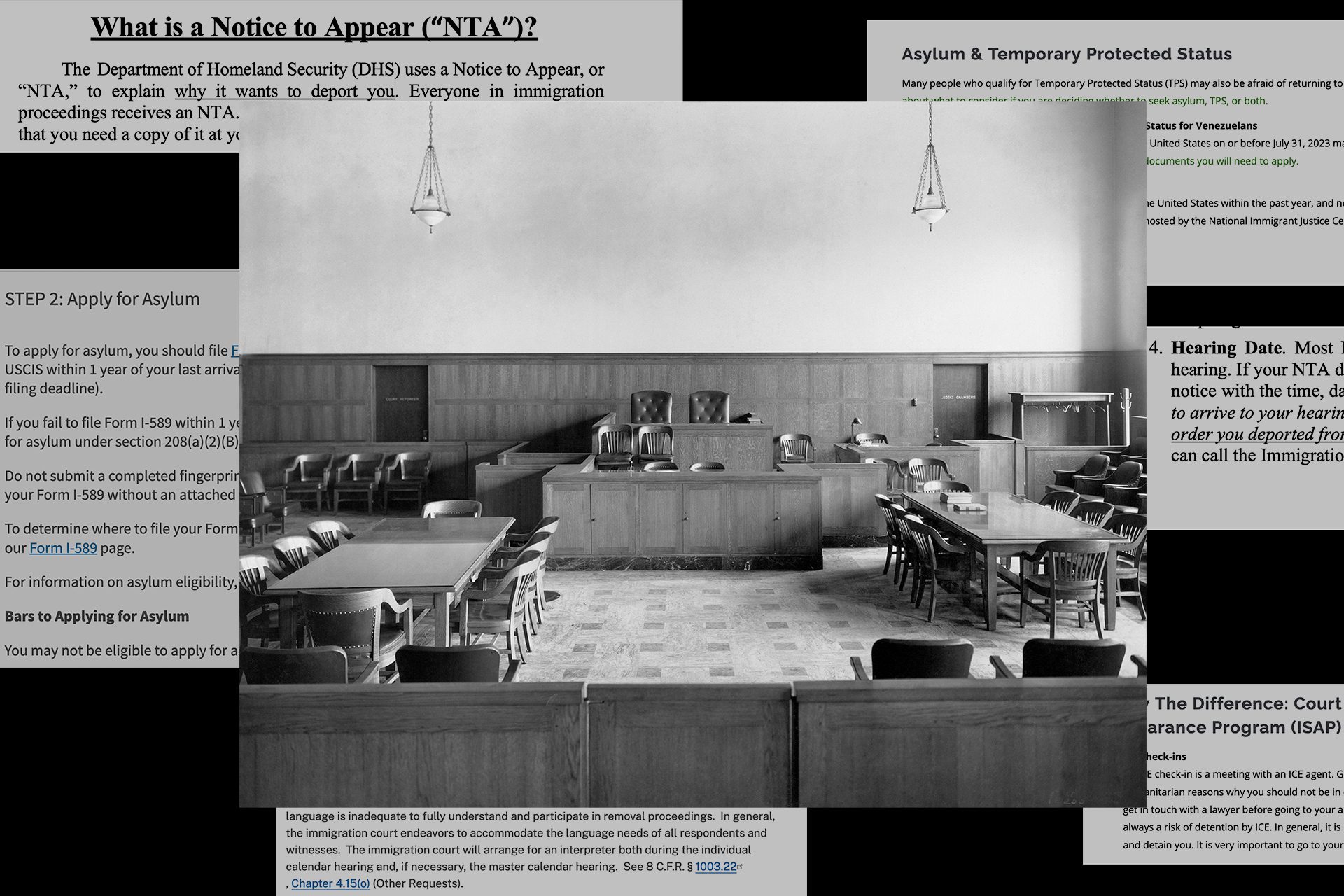 Photo illustration by Max Herman/Borderless Magazine. Photo by Underwood Archives, Inc / Alamy Stock Photo
Photo illustration by Max Herman/Borderless Magazine. Photo by Underwood Archives, Inc / Alamy Stock Photo Getting an attorney can be expensive and hard to find. Here are tips curated by Borderless on how to navigate immigration court.
This story is for information purposes only. Borderless Magazine does not provide legal assistance or legal advice.
Immigration court is a crucial step in the journey for many immigrants in the United States. In many cases, it’s where a judge decides whether people should be ordered removed or allowed to remain in the country.
Chicago’s Immigration Court, an arm of the U.S. Department of Justice’s Executive Office for Immigration Review, sees thousands of immigrants from Illinois and parts of Wisconsin and Indiana, who all come under one roof to have their cases adjudicated.
News that puts power under the spotlight and communities at the center.
Sign up for our free newsletter and get updates twice a week.
Throughout the city and state, there is a wide network of pro bono legal assistance and aid to support immigrants who find themselves navigating the immigration court system. But for a long time, the need for free and low-cost services far outpaced the available supply, and the recent influx of new arrivals has put the state’s already overburdened legal aid network to the test.
For many organizations, the ever-increasing demand for legal assistance has made it even more challenging to provide free legal services at immigration court. That means many people are navigating court alone, which is no easy task. In Illinois, only one in four immigrants with pending cases had a lawyer to represent them.
Borderless explains a few tips on how to prepare for immigration court if you are representing yourself.
1) Make sure to go to all of your court dates.
Your court dates are very important and are required by the U.S. federal government. If you miss a court date, immigration services may use that as grounds for your removal.
There are a few different types of hearings, but your first hearing will typically be a “master calendar hearing.” At these hearings, a judge will go through multiple cases in the same sitting, meaning you’ll probably hear a few other people’s cases before and after the judge hears yours.
You most likely will not be issued a removal order during the first hearing. This hearing is mainly a time for the judge to present the “charges” against you by the Department of Homeland Security. In most cases, immigrants face charges of unlawful entry into the United States. At this point, you have the opportunity to ask for more time to either find an attorney to argue your case or file an application for immigration relief.
2) You might already have an assigned court date, even if you haven’t received a notice yet.
A “Notice to Appear,” or NTA, is what the immigration court sends you to inform you of your removal proceedings and the charges against you by the Department of Homeland Security. Removal proceedings are also known as deportation proceedings. The NTA letter also states that you are required to appear in immigration court.
NTAs typically come in the mail, but they can sometimes get lost if you’ve recently changed your address. Other times, they’re delayed because of the federal backlog of immigration court cases.
To check if you have an NTA filed against you, you can call the federal immigration court at 1-800-898-7180. The hotline is open 24/7. You will need to provide your “alien registration number,” or “A number” to get more information about your next hearing date, time and location. (The A number is a nine-digit number used by the United States Citizen and Immigration Services to track all immigrants applying for permanent status.)
Read More of Our Coverage
You can also check the status of any pending NTAs online.
People are sometimes assigned a court location far from where they live. You can request a location change by filing a “Motion to Change Venue” and “Change of Address/Contact Information Form.”
A blank version of the “Motion to Change Venue” form can be found here. The Asylum Seeker Advocacy Project has a guide to filling out the form here. The form must be filled out in English.
Once you complete the form, you must do the following:
- Mail a copy of the completed forms to the court you were initially assigned to.
- Electronically submit or mail the completed forms to Chicago’s Department of Homeland Security office:
Office of the Principal Legal Advisor, Chicago
55 E. Monroe Street
Suite 1400
Chicago, IL 60603
3) Always keep your address up to date.
All of the updates about your immigration court case will come through the mail, so it’s crucial to keep your address with the court updated. You can change your address with the “Change of Address/Contact Information Form,” which can be submitted online or by mail.
4) Know what relief you qualify for.
If you are in removal proceedings and representing yourself in court, you can ask for more time or plead your case to stay in the United States by filing for immigration relief. Immigration relief means you are filing for legal status to remain in the country through U.S. Citizenship and Immigration Services.
Some forms of immigration relief include Temporary Protected Status, Victims of Trafficking Torture or Other Serious Crimes (VTTC) status, U-Visas and asylum.
You should apply for asylum or other appropriate relief as soon as possible. Unless you qualify for an exclusion, you must file for asylum within one year of your arrival date in the U.S.
When representing yourself in court, knowing what relief you qualify for and applying can provide legal avenues to remain in the country and help you get through your removal proceedings quickly.
Many organizations in Chicago can help you learn what forms of relief you may qualify for. You can find more information about organizations that provide immigration legal services on the Illinois Access to Justice page here. For free or pro bono legal representation in Wisconsin and Indiana, see the court’s national guide here.
5) Try your best to find a lawyer or seek legal counsel.
The tips above can help you prepare for immigration court on your own. Still, securing an attorney or legal aid can make or break your case.
According to the National Immigration Forum, someone’s chance of winning their asylum case is five times higher if they have an attorney to represent them. Many judges will give you more time to find a lawyer if you express that you want one. Be sure to ask your judge if you qualify.
The court will provide an interpreter if English isn’t your first language or the language you understand the best.
Here are links to organizations and directories in Illinois that provide legal support to immigrants.
- Illinois Department of Human Services List of Community Service Agencies Serving Immigrants
- Immigration Advocates Network National Immigration Legal Services Directory
- Illinois Access to Justice Partners
- University of Illinois, Law Clinic, Urbana-Champaign,
- American Immigration Lawyers Association (AILA)
- U.S. Department of Justice List of Pro Bono Lawyers by State
This story is for information purposes only. Borderless Magazine does not provide legal assistance or legal advice.


